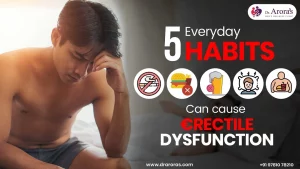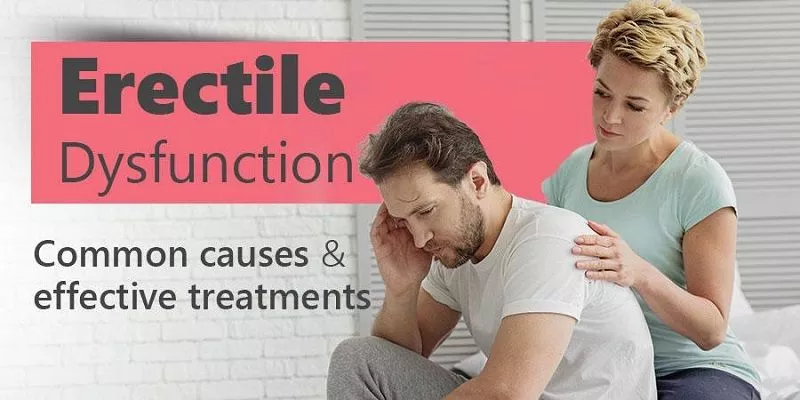Introduction
Erectile dysfunction (ED) is a condition that affects many men, and it’s often associated with aging, stress, or underlying medical issues. However, there are everyday habits that can play a huge role in triggering or worsening ED, and many of these habits are so common that most people don’t even realize the damage they might be causing. From poor diet choices to lack of exercise, simple lifestyle changes could be the key to improving your sexual health.
In this article, we’ll explore some of the surprising everyday habits that may be contributing to erectile dysfunction and offer practical tips for reversing the damage.
What Is Erectile Dysfunction?
Erectile dysfunction occurs when a man is unable to achieve or maintain an erection sufficient for sexual activity. This can happen occasionally, but when it becomes a persistent issue, it can seriously affect self-esteem, relationships, and overall well-being. While ED can be caused by physical conditions like diabetes, heart disease, or high blood pressure, it can also stem from psychological factors such as anxiety, depression, or stress.
However, everyday habits can also be a major contributor to ED. The good news is that by identifying these habits and making small changes, you can significantly reduce the risk of developing erectile dysfunction.
Everyday Habits That Could Be Causing Your Erectile Dysfunction

1. Poor Diet and Unhealthy Eating Habits
What you eat has a direct impact on your sexual health. A diet high in processed foods, unhealthy fats, and sugar can lead to clogged arteries, poor blood flow, and weight gain, all of which are major risk factors for erectile dysfunction. Foods that are high in trans fats, refined carbohydrates, and cholesterol can negatively affect vascular health, reducing blood flow to the penis and impairing erectile function.
For example, excessive consumption of fast food, sugary snacks, and fried foods can promote inflammation in the body and lead to cardiovascular problems. Since erections are highly dependent on blood flow, any condition that affects circulation—such as poor diet choices can lead to difficulties with achieving and maintaining an erection.
What to Do: To improve your sexual health, focus on a balanced diet rich in fruits, vegetables, lean proteins, and whole grains. Foods like leafy greens, nuts, berries, and fish rich in omega-3 fatty acids can help improve circulation and reduce inflammation, promoting better erectile function. Additionally, avoiding processed and high-sugar foods can improve overall health and prevent ED.
2. Lack of Physical Activity
Exercise is not only good for overall health, but it also plays a crucial role in maintaining sexual function. A sedentary lifestyle is a major risk factor for erectile dysfunction. Regular physical activity helps improve blood circulation, regulate hormones, and reduce stress—factors that directly influence erectile health.
When you don’t exercise regularly, blood circulation becomes sluggish, and your heart and blood vessels are less efficient. This can lead to poor vascular health, which is essential for achieving and maintaining an erection.
What to Do: Engage in regular physical activity such as walking, running, swimming, or cycling. Aim for at least 30 minutes of moderate exercise most days of the week. Exercise improves cardiovascular health, boosts testosterone levels, and helps maintain a healthy weight—all of which can reduce the risk of erectile dysfunction.
3. Chronic Stress and Anxiety
Stress and anxiety are common culprits behind erectile dysfunction. When you’re stressed, your body releases hormones like cortisol, which can interfere with normal sexual function. Chronic stress also increases the risk of developing high blood pressure, which can further impair blood flow to the penis.
Additionally, anxiety about sexual performance can create a cycle of stress and ED. The fear of not being able to perform sexually can actually make it more difficult to perform, creating even more anxiety.
What to Do: To reduce stress and anxiety, try relaxation techniques such as meditation, yoga, or deep breathing exercises. Regular exercise can also help reduce stress hormones and improve your mood. If you’re dealing with anxiety about sexual performance, consider speaking with a counselor or therapist who can help you address these concerns.
4. Excessive Alcohol Consumption
While drinking alcohol in moderation may not cause significant issues with sexual function, excessive alcohol consumption can lead to erectile dysfunction. Alcohol is a depressant, which means it can interfere with nerve signals and reduce blood flow, making it harder to achieve an erection. Long-term heavy drinking can also lead to liver damage, hormonal imbalances, and nerve damage—all of which can contribute to ED.
What to Do: If you consume alcohol regularly, it’s important to do so in moderation. The American Heart Association defines moderate drinking as up to one drink per day for women and two drinks per day for men. Cutting back on alcohol can help improve erectile function and overall health.
5. Smoking and Tobacco Use
Smoking and tobacco use are well-known risk factors for a variety of health problems, including erectile dysfunction. Nicotine and other chemicals found in tobacco products can damage blood vessels, reduce circulation, and impair the flow of blood to the penis. Over time, this can lead to long-term problems with erectile function.
Smoking also contributes to the development of atherosclerosis (narrowing of the arteries), which further restricts blood flow. As a result, smokers are at a higher risk of developing ED than non-smokers.
What to Do: Quitting smoking is one of the best things you can do for your sexual health. Within just a few months of quitting, you may notice improvements in blood circulation and overall erectile function. If you need support to quit smoking, consider seeking help from a healthcare provider or a smoking cessation program.
6. Poor Sleep Quality
Sleep is essential for good health, and poor sleep can lead to a variety of issues, including erectile dysfunction. During deep sleep, the body produces testosterone, which is vital for sexual health. Chronic sleep deprivation can lead to lower testosterone levels, making it harder to maintain an erection. Inadequate sleep also contributes to stress, anxiety, and poor overall health—factors that can exacerbate ED.
What to Do: Aim for 7-9 hours of quality sleep each night. Create a bedtime routine that promotes relaxation, avoid caffeine and heavy meals before bed, and limit screen time to improve your sleep quality. A consistent sleep schedule is key to maintaining optimal hormone levels and reducing the risk of erectile dysfunction.
7. Overuse of Prescription Medications
Some prescription medications can interfere with sexual function and contribute to erectile dysfunction. Drugs used to treat conditions such as high blood pressure, depression, and anxiety can have side effects that impair blood flow, reduce libido, and cause erectile issues. It’s important to talk to your doctor if you think a medication may be contributing to ED.
What to Do: If you suspect that your medications are affecting your sexual health, consult your doctor. There may be alternative treatments or adjustments to your current medication regimen that can help improve your erectile function.
Conclusion
Erectile dysfunction can be a frustrating and embarrassing condition, but understanding the everyday habits that contribute to it is the first step toward regaining control. By making healthier lifestyle choices, such as improving your diet, exercising regularly, managing stress, cutting back on alcohol and tobacco, and getting enough sleep, you can significantly reduce your risk of ED and improve your sexual health.
Remember, ED is often a signal that something else is going on in your body. By taking proactive steps to address lifestyle habits, you can improve not just your sexual health, but your overall well-being. If you continue to experience difficulties, don’t hesitate to consult a healthcare professional who can provide guidance and treatment options tailored to your specific needs.











